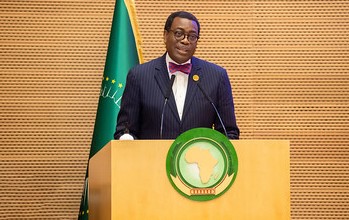By Bassey Udo
The African Development Bank (AfDB) Group has impact over 500m lives across Africa through its High 5s Agenda in the last decade, its President, Dr. Akinwumi A. Adesina, has disclosed.
The Bank’s High 5s Agenda was conceived to “Light up and Power Africa”, “Feed Africa”, “Industrialize Africa”, “Integrate Africa”, and “Improve the Quality of Life for the People of Africa”.
Adesina, whose tenue as the Bank Group’s president is coming to an end on September 1, 2025, said in his farewell address to Heads of State and Government at the 38th African Union Summit that the AfDB under his leadership delivered a decade of remarkable achievements by driving Africa’s economic transformation.
Adesina, who is also the Chairman of the Group’s Boards of Directors, said during the period the Bank witnessed unprecedented partnerships to advance the goal of the African Union towards achieving Agenda 2063.
During the meeting held in Addis Ababa, the African leaders considered and endorsed four AfDB-led initiatives, including the drive to connect 300m Africans to electricity by 2030, measuring Africa’s green wealth as part of its gross domestic product (GDP), an innovative facility to provide Africa with a financial buffer, and a roadmap for the continent to achieve inclusive growth and rapid sustainable development.
Dr. Adesina said the Bank under his leadership transformed over 515m lives, including 231m women, over the past decade.
A breakdown of the impacts showed that 127m gained access to better services in terms of health; 61m people gained access to clean water; 33m people benefited from improved sanitation; 46m people gained access to ICT services, and 25m people gained access to electricity.
He cited the landmark Africa Energy Summit held in Tanzania in January, where 48 nations signed the Dar Es Salaam Declaration to adopt bold policies in support of an initiative by the World Bank and the African Development Bank to extend electricity access to 300m Africans by 2030.
That meeting, attended by 21 heads of state, he said, secured $48bn in commitments from the two institutions and an additional $7bn from other development partners.
In addition, the Addis Ababa Summit endorsed the Dar Es Salaam Energy Declaration, the Baku Declaration by African Heads of State on Measuring the Green Wealth of Africa.
Besides, the Assembly adopted the African Financing Stability Mechanism, a groundbreaking initiative mandated by the African Union Heads of State and Government.
Co-led by the African Union Commission and the African Development Bank, the Assembly could generate, if immediately implemented, approximately $20bn in debt servicing savings for African countries by 2035.
The Assembly also adopted the Strategic Framework on Key Actions to Achieve Inclusive Growth and Sustainable Development in Africa report which outlines key actions required to enable Africa to achieve and sustain an annual growth rate of at least 7% of GDP over the next five decades.
On food security, Adesina cited the Bank’s Technologies for African Agricultural Transformation (TAAT), the Dakar 2 Food Summit that mobilized $72bn in 2023, and the $1.5bn Africa Emergency Food Production Facility launched in May 2022, to avert a major food and fertilizer crisis triggered by global conflicts.
“The African Development Bank accelerated food production in Africa. Over 101m people became food secure. We mobilized $72bn to implement the food and agriculture delivery compacts across the continent,” he stressed. With the support of the Bank, Ethiopia has achieved self-sufficiency in wheat production within four years and is now a wheat-exporting nation,” Adesina said.
A review of a decade of transformative impact by the Bank showed a strong focus on job creation, with 1.7m youth trained in digital skills, while rolling out Youth Entrepreneurship Investment Banks to drive youth-led economic growth.
“Our goal is simple: create youth-based wealth across Africa,” he said.
In addition, he disclosed that the Affirmative Finance Action for Women in Africa (AFAWA) initiative provided $2.5bn in financing to over 24,000 women-owned businesses.
Over the past decade, he said the AfDB invested over $55bn in infrastructure, making it the largest multilateral financier of African infrastructure.
The Bank, he pointed out, prioritized healthcare, by committing $3bn in quality healthcare infrastructure and another $3bn for pharmaceutical development, including establishing the Africa Pharmaceutical Technology Foundation.
Historic Financial Mobilization for Africa
Under his presidency, Adesina said the AfDB achieved its largest-ever capital increase, from $93bn in 2015 to $318bn currently, with the most recent replenishment of the African Development Fund, the Bank Group’s concessional window, which raised a record $8.9bn for Africa’s 37 low-income countries, setting the stage for a target of $25 billion for its upcoming 17th replenishment.
He said the Africa Investment Forum, a joint effort with eight other partner institutions, mobilized over $200bn in investment commitments, reinforcing Africa as a leading investment destination.
The outgoing AfDB chief expressed gratitude to the African Heads of State, the African Union Commission, regional economic communities, and the people of Africa for their support.
Several of the Heads of African governments and AU officials paid glowing tribute to Dr. Adesina for his exceptional leadership of the Bank and strong global advocacy for Africa.
Th UN Secretary-General António Guterres, reiterated calls for reform of the international financial architecture hampering the development of many African economies, affected by expensive debt repayments and high borrowing costs, which limits their capacity to invest in education, health and other essential needs
The Prime Minister of Barbados, Mia Mottley emphasized Africa’s strategic role in shaping global economic trends, particularly highlighting the continent’s control of 40% of the world’s minerals.
Mottley who stressed the importance of addressing emerging challenges like artificial intelligence, urged African nations to take a proactive role in technological advancement rather than becoming “victims of technology.”
She also underscored the urgency of removing artificial barriers between Africa and the Caribbean, calling for the elimination of transit visa requirements to boost trade and integration.
Mottley echoed demands for reparatory justice, noting that both the Caribbean and Africa began their independence journey with “chronic deficits” in resources, fairness, and opportunity.




